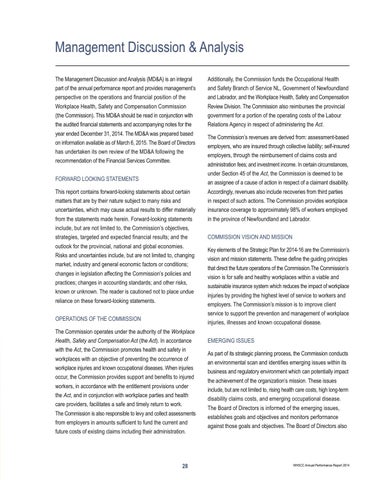Management Discussion & Analysis The Management Discussion and Analysis (MD&A) is an integral part of the annual performance report and provides management’s perspective on the operations and financial position of the Workplace Health, Safety and Compensation Commission (the Commission). This MD&A should be read in conjunction with the audited financial statements and accompanying notes for the year ended December 31, 2014. The MD&A was prepared based on information available as of March 6, 2015. The Board of Directors has undertaken its own review of the MD&A following the recommendation of the Financial Services Committee. FORWARD LOOKING STATEMENTS This report contains forward-looking statements about certain matters that are by their nature subject to many risks and uncertainties, which may cause actual results to differ materially from the statements made herein. Forward-looking statements include, but are not limited to, the Commission’s objectives, strategies, targeted and expected financial results; and the outlook for the provincial, national and global economies. Risks and uncertainties include, but are not limited to, changing market, industry and general economic factors or conditions; changes in legislation affecting the Commission’s policies and practices; changes in accounting standards; and other risks, known or unknown. The reader is cautioned not to place undue reliance on these forward-looking statements. OPERATIONS OF THE COMMISSION The Commission operates under the authority of the Workplace Health, Safety and Compensation Act (the Act). In accordance with the Act, the Commission promotes health and safety in workplaces with an objective of preventing the occurrence of workplace injuries and known occupational diseases. When injuries occur, the Commission provides support and benefits to injured workers, in accordance with the entitlement provisions under the Act, and in conjunction with workplace parties and health care providers, facilitates a safe and timely return to work. The Commission is also responsible to levy and collect assessments from employers in amounts sufficient to fund the current and future costs of existing claims including their administration.
28
Additionally, the Commission funds the Occupational Health and Safety Branch of Service NL, Government of Newfoundland and Labrador, and the Workplace Health, Safety and Compensation Review Division. The Commission also reimburses the provincial government for a portion of the operating costs of the Labour Relations Agency in respect of administering the Act. The Commission’s revenues are derived from: assessment-based employers, who are insured through collective liability; self-insured employers, through the reimbursement of claims costs and administration fees; and investment income. In certain circumstances, under Section 45 of the Act, the Commission is deemed to be an assignee of a cause of action in respect of a claimant disability. Accordingly, revenues also include recoveries from third parties in respect of such actions. The Commission provides workplace insurance coverage to approximately 98% of workers employed in the province of Newfoundland and Labrador. COMMISSION VISION AND MISSION Key elements of the Strategic Plan for 2014-16 are the Commission’s vision and mission statements. These define the guiding principles that direct the future operations of the Commission.The Commission’s vision is for safe and healthy workplaces within a viable and sustainable insurance system which reduces the impact of workplace injuries by providing the highest level of service to workers and employers. The Commission’s mission is to improve client service to support the prevention and management of workplace injuries, illnesses and known occupational disease. EMERGING ISSUES As part of its strategic planning process, the Commission conducts an environmental scan and identifies emerging issues within its business and regulatory environment which can potentially impact the achievement of the organization’s mission. These issues include, but are not limited to, rising health care costs, high long-term disability claims costs, and emerging occupational disease. The Board of Directors is informed of the emerging issues, establishes goals and objectives and monitors performance against those goals and objectives. The Board of Directors also
WHSCC Annual Performance Report 2014








